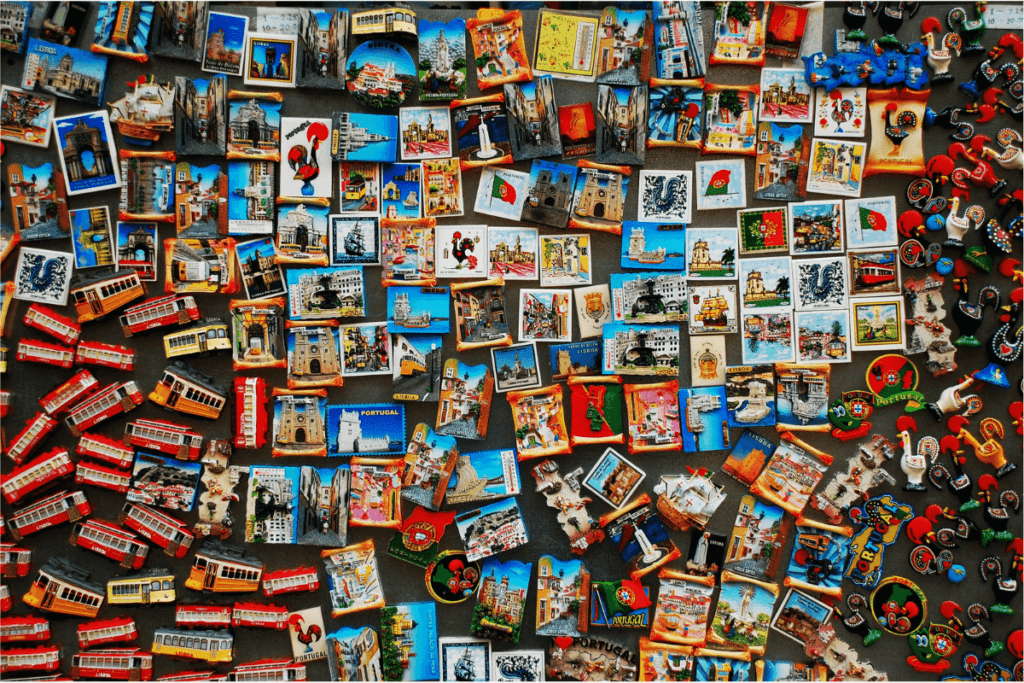
Tourism souvenir shops have always been so perplexing. We travel hundreds, if not thousands, of miles to explore a new place and immerse ourselves in a new culture, only to wind up in a gift shop that looks suspiciously like the one at our own tourist spots back home. A plastic mini license plate of the country we are visiting, a little glass bottle filled with plastic seashells, and a necklace with plastic beads made in China. Keep reading to hear our case for ethical souvenirs, and some creative ways to bring a piece of your travel experience home with you.
While it is super thoughtful to bring gifts to your loved ones back home, not to mention collecting a few items to jog your own memory, what’s the point of collecting a bunch of plastic crap (pardon our French)? It’s bad for the environment, does not support local artisans and communities, nor does it serve the main purpose of a souvenir—authenticity.
What Are Ethical Souvenirs?
It’s completely normal to want to bring home souvenirs after a great vacation, but can we move away from plastic gifts (and terrible gift shops)? Let’s all agree that ethical souvenirs are the future. When we say “ethical souvenirs” we mean a few things.
Ethical souvenirs are NOT:
- Any kind of mass-produced plastic
- Part of the natural environment (like collecting seashells or rocks)
- Stolen pieces of heritage (like something that has indigenous value)
Ethical souvenirs are:
- Locally made
- Support the local economy of the place you’re visiting
- Can be used to reduce waste on your trip, like a locally made canvas tote or clothing item (ie. a handmade hat or locally cut and dyed sarong)
- Experiences! Yes, a souvenir can be a fantastic memory (with a few photos to remind you later)
The Travel Yogi’s Favorite Ethical Souvenirs
Souvenirs historically serve the purpose of collecting memories, but it’s our belief that souvenirs have the potential to be so much more than a generic thing that wasn’t even made in the country you visited.
Using some of our favorite spots around the world as inspiration, here are our favorite ethical souvenirs from some of the most fascinating places on this floating sphere we all call home.
Kikoi From Kenya
On an adventure in Kenya, you’d be remiss to skip out on safari amazingness. But as you shimmy your woke-up-at-4-am-to-see-lions body to the gift shop, maybe think twice before you buy a giraffe magnet for your refrigerator.
The Kikoi is a traditional fabric used primarily by the Maasai people of Kenya. Women most commonly use the fabric to carry babies on their backs, but men also wear it. The kikoi makes a wonderful souvenir, handmade by locals, with your purchase going to locals (depending on where you choose to buy) and actually representative of local culture.
By ditching plastic at the Kenyan gift shop (say no to the mass-produced batik paintings and giant giraffes that you will probably hide in a closet back home) you are also contributing to a Kenyan initiative to reduce plastic waste. Single-use plastic bags were made illegal in Kenya in 2018.
At The Travel Yogi, we were diligent about choosing locations on our Kenya safari that have a true connection with local communities or are owned and operated by locals. At any of our accommodations outside of Nairobi, you can buy items from the accommodations knowing they were locally made and profits are equitably shared with the community and/or the artist.
Now that you know what you’ll bring home, why not dive into the 10-day, 9-night Kenya Yoga Adventure and let us worry about the itinerary?
Snorkel With Marine Biologist in Fiji
Research shows, again and again, that material things don’t lead to longterm happiness, experiences do. Well, why not take that logic and apply it to your souvenir shopping, too? Instead of buying a mini plastic ocean globe (like, come on, why?), go snorkeling. To make it even better, why not bring a marine biologist along with you and learn as you look? That’s exactly what you’ll have the opportunity to do on The Travel Yogi Fiji Yoga Adventure.
Even people with “bad memory” won’t be able to forget watching a Finding Nemo-esque panoply of colorful marine life swim by with the marine biologist writing names and info on their underwater tablet. And, as the TTY team knows from experience, the Sergeant Major fish will nibble toes and fingers but it feels like a tickle! How cool of a memory souvenir is that?
Sheep Wool Clothing From Patagonia
Among your hiking, kayaking, hot tubbing, and yoga-ing in the glacier-blue water beauty of Patagonia on our Patagonia Yoga Adventure, you’ll notice something: there’s, um, a lot of sheep there. Thank goodness for that too, because even in their summer months (ie. when you’ll be there), the evenings can get chilly!
Local Patagonian artisans use sheep’s wool to make clothes: from sweaters to hats to cute home decor. You’ll be supporting local and traditional trade as well as reducing plastic creation and waste in the country.
Patagonia’s water is so clean in rivers and streams that you can safely drink from them. By traveling with us in this lesser-known region of Patagonia you’re helping to keep the Fu river undamned and flowing—and supporting the local community.
Omnom Chocolate from Iceland
You can drink from the water in Iceland (like in Patagonia), so let’s keep it that way. On our Iceland Yoga Adventure, you’ll have the chance to fill up your memory tank with waterfalls, geysers, and the culinary delight of omnom chocolate.
You know, chocolate that’s so good that you can’t help but go “om-nom-nom-nom” while you munch on it? Food can be such a great tool for jogging memory, so while you’re having a blast in Iceland, eat the local chocolate, and then bring it home to enjoy when you’re missing it later.
So How About We All Cut The Souvenir Crap…
Capitalism has us convinced that every part of life would be a little bit better with more products to commemorate it. We visit a new city and come home with a keychain with our name on it (someone, please explain this one to us, it is just so odd!). We travel to Croatia and then come home with a mass-produced painting from China.
When we take a moment to consider what actually makes us happy (experiences!) and what is actually good for the local economies and ecosystems of the countries we visit, we find that less is more.
By saving money on all of those plastic trinkets that no one likes anyway, you can have more money to pay for experiences that lead to memories, and more money goes into the hands of local artisans and communities. Conscious buying always matters, but never more than when we’re out adventuring and meeting the people who can benefit from those dollars. Plus, how cool is it to look at your hand-woven hat and remember the smile of the person who made and sold it to you? When you’re ready for your next international adventure, you know where to find us. We (The Travel Yogi) can’t wait to collect ethical souvenirs with you soon!

